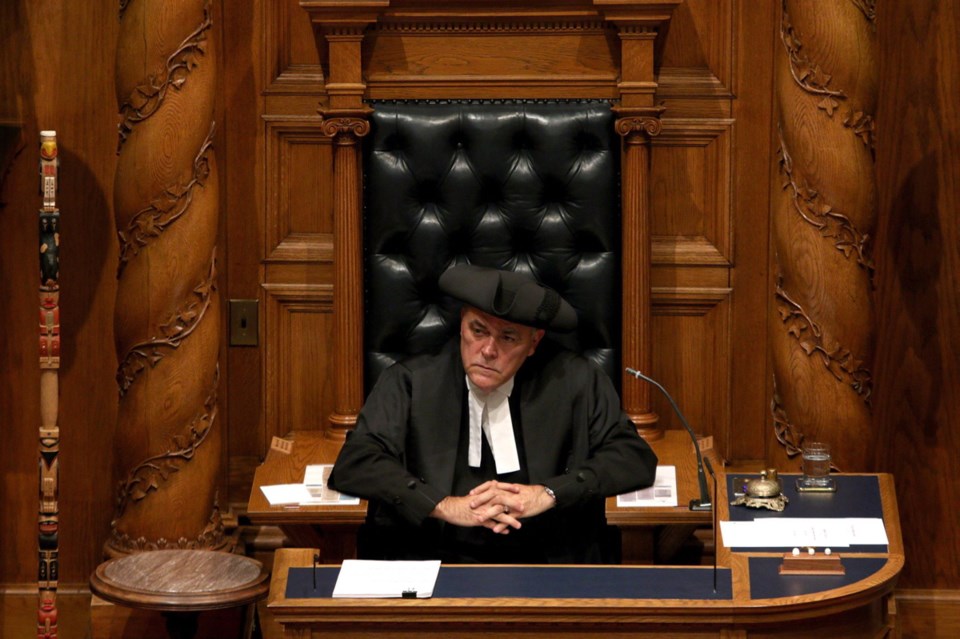ENTIRELY PARLIAMENTARY — Opposition house leader Mike de Jong went to the wall this past week to defend the Opposition’s right to call people names in the legislature.
The Liberals have taken great glee of late in creating fictional portfolios for NDP cabinet ministers. Jobs, Trade and Technology Minister Bruce Ralston has become the “minister of job loss,” Transportation Minister Claire Trevena the “minister of taxis” and Premier John Horgan the “minister of defence” — an epithet he apparently earned by coming to the aid of struggling ministers during question period.
Speaker Darryl Plecas finally grew tired of the running gag after Liberal environment critic Peter Milobar referred to Agriculture Minister Lana Popham as the “minister of intimidation.”
“Member, if I may ask you to rephrase that,” Plecas said. “We will not accept a reference to a minister of intimidation. We have no such minister.”
De Jong, a Liberal leadership contender, leapt to Milobar’s defence by claiming to have “canvassed the authorities and the conventions” of the house and turned up nothing that prevented such antics.
“There are strict conventions about parliamentary language, and I recognize that,” he said. “They have developed over many, many years, and they are important. It’s important that we all respect them.
“But nothing that the honourable member has just said contravenes any of those rules, and it is fundamentally improper, in my view, to demand that they be withdrawn.”
Then, just in case it wasn’t clear, de Jong added: “The ‘minister of intimidation’ is entirely parliamentary, and they will not be withdrawn.”
Plecas backed down, but he wasn’t happy about it. “Members, the point I’m trying make is that temperance and moderation are important to dialogue,” he said. “My preference would be that you not use that language in this house.”
The following day, buoyed by de Jong’s rousing defence of the public interest and, apparently, in the absence of any new material, Milobar was back to calling Popham the “minister of intimidation.”
—
INSTAGRAM IMBROGLIO — B.C. Liberals and NDP have been skirmishing for weeks about each other’s incriminating photo albums.
Citizens’ Services Minister Jinny Sims keeps cropping up in photos at events where individuals who are having difficulties with the weapons section of the Criminal Code are also prominent guests.
Liberals have cited her appearance at a fundraiser where a convicted criminal and an accused violent offender showed up, dubbing it a “cash from convicts” fundraiser. She was also at a campaign office event where someone facing other serious weapons charges attended. This week they cited her for attending the opening of that person’s business.
She was earlier accused of “snuggling up” for a picture with an offender and has faced questions along the lines of: “How many convicted criminals or those facing charges does the minister have among her inner circle?”
Sims has insisted she has to attend public events where various other dignitaries are on hand as well, and B.C. Liberals have also had contact with the individuals.
This past week, the NDP fired back, releasing pictures of various Liberals with the offender, plus others with party supporters accused of drug charges.
It’s getting to the point where criminal record checks might be in order at political events.
—
INSOMNIA CURE — Green Party Leader Andrew Weaver blasted the NDP government in the house recently for “shocking, reckless indifference” — to the rules of grammar.
Debating a “minor corrections” bill that makes exactly what the title implies to a host of bills, he found one that correctly changes “whom” to “who.” But later on, in the Farm Practices Protection Act, a glaringly offensive “whom” was left untouched.
“Shame on the government for missing this,” he joked.
Attorney General David Eby dove headfirst into some other changes later.
“The Farm Practices Act included regulatory authority under section 10(3), which gave authority for the board to engage or retain consultants in accordance with regulations under section 12(2)(d). Section 12(2)(d) referred to the fact that [cabinet] can make regulations ‘for the purpose’ of section 10(3), not the purposes…”
But section 10 was repealed in 2015. There was an attempt to repeal 12(2)(e) too, but it failed. Why? Because it read “for the purposes … ” when the actual section said “for the purpose.”
“By making it singular, then the attempted amendment becomes operative,” Eby said. “The whole section is struck, and the member will be able to sleep at night.”
Weaver, still awake at this point, said he looked forward to a good night’s sleep.
Elsewhere, another amendment changes “inpatient” to “in-patient” in the Forensic Psychiatry Act.
Legislative drafters are going by the Oxford Canadian Dictionary.
Weaver is a Merriam-Webster man and it doesn’t recognize the hyphen, but he deferred.
Inexplicably, there was no debate about an amendment to another law that changes “out patient” to “outpatient.”
Why no hyphen?
— Les Leyne and Lindsay Kines



